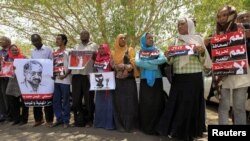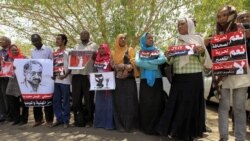Sudanese journalists continue to struggle under heavy handed government censorship and harassment. Most recently, Ahmed al-Nour, one of Sudan's most prominent journalists and editor of the al-Sahafa newspaper was dismissed from his position by security forces. Al-Nour was accused of insulting a member of the national intelligence and security services, or NISS. After his removal, his name was stripped from the masthead.
"This case," said U.S. State Department Acting Deputy Spokesperson Patrick Ventrell, "demonstrates the targeted intimidation and repression newspapers and journalists face in Sudan."
The government has launched a campaign of censorship and reprisal against newspapers. NISS targets newspapers and often bans distribution of entire editions to inflict financial losses as punishment for critical coverage. The deliberate constriction of the space for free political expression in Sudan does not serve the government's interest nor those of the Sudanese people.
According to the most recent State Department Human Rights Report, NISS continues to target aggressively journalists and publications through contrived legal proceedings, politicized criminal charges, and confiscations.
In October 2012, freelance Sudanese journalist Somaya Hundosa was abducted near her home and found several days later. Non-governmental organizations and international media reported security agents detained and tortured her. Ms. Hundosa claimed her captors showed her articles she had written and accused her of disrespecting the president’s government. The Security service had questioned her two days before her abduction.
Government security agencies banned at least 13 journalists from writing or publishing. In addition to direct and prepublication censorship, the Security service instructed newspaper management boards not to allow certain journalists to write in their publications or face the prospect of having the paper closed. Those banned included journalists and editors from publications such as Al-Sahafa, Al-Jarida, the suspended newspaper Rai Al-Shaab, and the pro-Islamist Alwan.
The United States calls on the government of Sudan to release all journalists in prison for criticisms of the government and to implement reforms that expand freedom of expression as well as protect universal human rights.
Freedom of the press is a fundamental human right that should be respected by all governments, including Sudan. As Thomas Jefferson, third president of the United States wrote, "The only security of all is in a free press."
"This case," said U.S. State Department Acting Deputy Spokesperson Patrick Ventrell, "demonstrates the targeted intimidation and repression newspapers and journalists face in Sudan."
The government has launched a campaign of censorship and reprisal against newspapers. NISS targets newspapers and often bans distribution of entire editions to inflict financial losses as punishment for critical coverage. The deliberate constriction of the space for free political expression in Sudan does not serve the government's interest nor those of the Sudanese people.
According to the most recent State Department Human Rights Report, NISS continues to target aggressively journalists and publications through contrived legal proceedings, politicized criminal charges, and confiscations.
In October 2012, freelance Sudanese journalist Somaya Hundosa was abducted near her home and found several days later. Non-governmental organizations and international media reported security agents detained and tortured her. Ms. Hundosa claimed her captors showed her articles she had written and accused her of disrespecting the president’s government. The Security service had questioned her two days before her abduction.
Government security agencies banned at least 13 journalists from writing or publishing. In addition to direct and prepublication censorship, the Security service instructed newspaper management boards not to allow certain journalists to write in their publications or face the prospect of having the paper closed. Those banned included journalists and editors from publications such as Al-Sahafa, Al-Jarida, the suspended newspaper Rai Al-Shaab, and the pro-Islamist Alwan.
The United States calls on the government of Sudan to release all journalists in prison for criticisms of the government and to implement reforms that expand freedom of expression as well as protect universal human rights.
Freedom of the press is a fundamental human right that should be respected by all governments, including Sudan. As Thomas Jefferson, third president of the United States wrote, "The only security of all is in a free press."

















